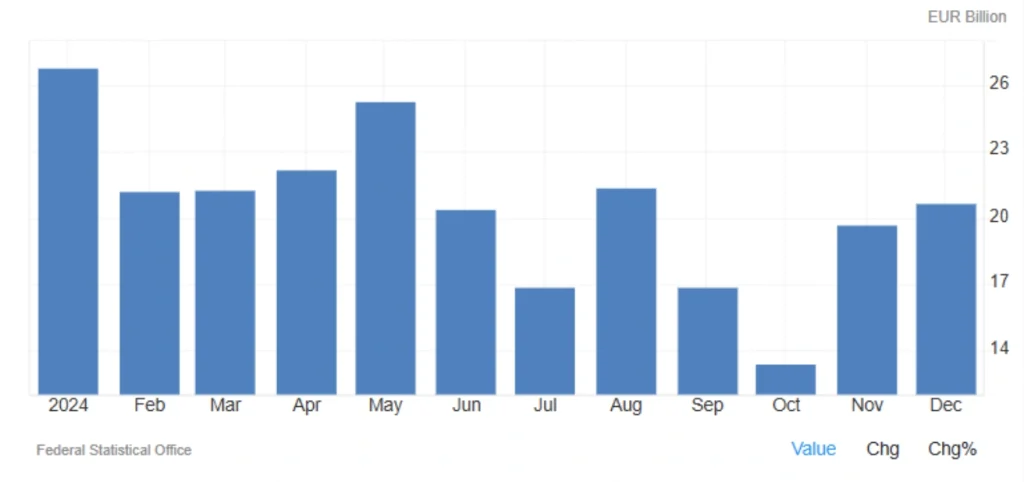
Germany’s Trade Surplus Hits a New High in December 2024
Germany’s trade surplus surged to €20.7 billion in December 2024, marking a significant increase from €19.2 billion in November and exceeding market expectations of €17 billion. This figure represents the highest trade surplus since August 2024, driven by an unexpected boost in exports and steady import growth.
Unexpected Export Growth Defies Predictions
Contrary to forecasts predicting a 0.6% decline, Germany’s exports rose by 2.9%, reaching €131.7 billion—the fastest growth since January 2024. A key driver of this surge was the rising demand from EU countries, where exports increased by 5.9%, including a 6.7% jump to the Eurozone and a 3.9% rise to non-Euro EU countries. However, exports to non-EU markets saw a decline, with shipments to the U.S. falling by 3.5%, Russia dropping by 19.9%, and the UK decreasing by 6.6%.
Imports Also on the Rise
Germany’s imports grew by 2.1%, reaching €111.1 billion, fueled by a 3.6% rise in imports from the EU. Additionally, imports from other regions increased by 0.5%, with notable gains from the U.S. (+3.0%) and Russia (+14.4%). This simultaneous growth in both exports and imports highlights a broader recovery in Germany’s manufacturing and industrial sectors.

What Does This Mean for Germany’s Economy?
1. A Strengthened Regional Trade Network
The unexpected surge in exports to the EU suggests a strengthening regional economy, which could support Germany’s economic stability and sustain future growth.
2. Global Trade Challenges Persist
Despite strong EU demand, the decline in exports to the U.S., UK, and Russia may signal geopolitical and economic hurdles, posing potential risks for German exporters.
3. Implications for the Eurozone
As Europe’s largest exporter, Germany’s trade performance significantly influences the Eurozone economy. While increased exports to the EU are a positive sign, weaker trade relations with major non-EU markets could present long-term challenges.
Read More: Germany Services PMI Drops to 49.3
Will Germany’s Export Growth Continue?
Germany’s robust trade surplus in December 2024 reflects a resilient economy, but challenges lie ahead. The declining demand from key global partners raises concerns about sustained trade momentum. Moving forward, investors and policymakers must closely monitor global trade dynamics and economic policies to assess whether Germany’s export-driven growth remains stable.
Share
Hot topics

Best broker for gold trading
There’s always been a certain magic about gold. Before online charts and trading applications, people stored their wealth in coins and bars, trusting that gold would retain its value during...
Read more




Submit comment
Your email address will not be published. Required fields are marked *